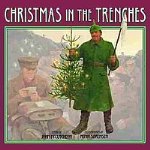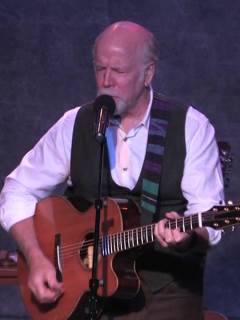

Christmas in the Trenches - Words and music by John McCutcheon

Before I tell you about the song I have selected as the second one to go under the Dai Woosnam microscope, let me preface this article with what will become part of the wallpaper in this series: if you like, see the following four bullet points as being akin to the “small print” in this contract between you the reader, and me the writer. Here goes...
Having gone to the USA for my first choice, I go there again for my second. But this time, we have a song that could not be more European in content, even if one tried.
A song written and sung by an American: an artiste much better known in Europe than my previous choice, David Wilcox. And the song is much better known too.
That said however, there will be some readers of this who are not overly familiar with this majestic song: so for them, I print the lyrics in full.
But before I do, let me start with a confession. And it concerns my lack of “small talk”. And takes me back nearly 19 years.
It was two weeks short of the new millennium, when I moved from my home in the valleys of South Wales, to my present home in Grimsby, a fishing town on the East Coast of England. And I had to introduce myself to a plethora of new people. But remember, I lack those social niceties: I have not the ability to shoot the breeze about all manner of inconsequential matters. So I needed an artificial gambit.
And I found it by realising that I had moved to the fish and chip shop capital of Britain, and was thus able to keep a conversation going by asking my new acquaintances to tell me the best three fish and chip shops in the town.
And one day I wondered where I had got this from: and it suddenly occurred to me that it was from our songwriter today, John McCutcheon. (Well, in a manner of speaking, I got it from him.)
Let me explain.
It is 1992 at the mighty Cambridge Folk Festival. John is onstage, and is about to deliver his greatest composition. But before he does, he prefaces it with a remarkable anecdote.
He tells us that whenever he performs anywhere new, he will in a spare moment after setting up, doing his soundcheck, etc., then indulge in a bit of conversation with a stranger. And he always starts by asking them the same question, viz... “tell me of some incident or story that you think is quite unforgettable and deserves to be better known?”
And I figured years later, if such a ruse was good enough for John McCutcheon, then as sure as heck it was good enough for me. Granted the circumstances were different, and I was not looking for material for a song lyric. But I can promise you, John McCutcheon helped tongue-tied me, more than he will ever know that night at Cambridge.
And as for what he said in introducing his glorious Christmas In The Trenches: well, my memory seems to recall him saying that he was performing at a college in America, and got talking to the cleaning lady and asked her that favourite question of his. And quick-as-a-flash came her answer “The Christmas truce of 1914”.
John admitted he was not remotely au courant with the events of what had occurred some seventy years previously, but immediately made it his business to read anything and everything on the remarkable event. And eventually came up with this deeply moving song.
Here are the lyrics: please read them closely. And concentrate hard now please, taking in the words...
Christmas In The Trenches My name is Francis Tolliver, I come from Liverpool Two years ago the war was waiting for me after school To Belgium and to Flanders, to Germany to here I fought for King and Country, I love dear It's Christmas in the trenches where the frost so bitter hung The frozen fields of France were still, no Christmas songs were sung Our families back in England were toasting us that day Their brave and glorious lads so far away Well I was lying with my mess-mates on the cold and rocky ground When across the lines of battle came a most peculiar sound Says I "Now listen up me boys", each soldier strained to hear As one young German voice sang out so clear "He's singing bloody well you know" my partner says to me Soon one by one each German voice joined in in harmony The cannons rested silent, the gas clouds rolled no more As Christmas brought us respite from the war Well as soon as they were finished, and a reverent pause was spent 'God rest ye merry, gentlemen', struck up some lads from Kent The next they sang was 'Stille Nacht', "Tis 'Silent Night'" says I And in two tongues one song filled up that sky "There's someone coming towards us" the front-line sentry cried All sights were fixed on one lone figure trudging from their side His truce flag, like a Christmas star, shone on that plain so bright As he bravely strode, unarmed, into the night Soon one by one on either side walked into No Mans Land With neither gun nor bayonet we met there hand to hand We shared some secret brandy and we wished each other well And in a flare-lit soccer game we gave 'em hell We traded chocolates, cigarettes and photographs from home These sons and fathers far away from families of their own Young Sanders played his squeeze box: they had a violin This curious and unlikely band of men Soon daylight stole upon us and France was France once more With sad farewells we each began to settle back to war But the question haunted every heart that beat that wondrous night "Whose family have I fixed within my sights?" 'Twas Christmas in the trenches where the frost so bitter hung The frozen fields of France were warmed as songs of peace were sung For the walls they'd kept between us to exact the work of war Had been crumbled and were gone for evermore Oh my name is Francis Tolliver, in Liverpool I dwell Each Christmas come since World War One I've learned its lessons well That the ones who call the shots won't be among the dead and lame And on each end of the rifle we're the same
The melody is sublimely simple and fits the lyric like a glove. It seems just too good to be true: surely John must have subconsciously lifted it from somewhere? But no: it genuinely is a McCutcheon original. But he does rather cleverly on two occasions weave in - as a solo instrumental break for his compelling acoustic guitar - a few bars of that grand old song favoured by Irish patriots: The Minstrel Boy.
Let me give you this link to the great man singing it himself. If you have never seen him sing this before, well by gosh, you are in for a real treat. Volume up full please:
Having now listened to him, don’t you reckon his song just oozes integrity and sincerity? Everything about that six and a half minutes just seems so right. And excuse the pun when I say that there was not a false note there.
Let’s now dive into the song sober – and as someone once famously said – at the end of it, come up drunk and dizzy with the beauty of it all. Let us first take the opening line:
My name is Francis Tolliver, I come from Liverpool
Straight away one is arrested by it. Why exactly?
Well, it is the name Francis Tolliver that does it for me. Not just the surname, but the Christian name too.

You see, there were countless chaps called Francis in Britain in 1914. But I contend that the vast majority of them would have called themselves Frank, not Francis. And as for Tolliver, what I can say with some certainty, is that possessing a fairly rare surname myself, I am always on the lookout for even rarer names. And trust me, the name Tolliver is one I had never ever heard, before I encountered it in this song. And I am someone who has been around a bit, and have a reasonably good memory for names.
So to my British ear, had he sang “My name is Frank (or Frankie) Oliver”, it would not have ambushed me so, with Oliver being a not uncommon surname here in the UK. But Tolliver? No, that was so different. Yet oddly it worked, in that it immediately added a sort of verisimilitude, and told me (wrongly) that the writer was basing his song on a real life character. And you are thus, from the get-go, hanging on his every word.
Interestingly, I just did a Google search, putting just the name Tolliver in the search box. And I was astounded with the plethora of different Tollivers that flashed up. Staggering really. And it was enough to almost make me eat my words and delete the last few paragraphs, until – fortunately for me – something else became apparent.
The staggering thing was that all these names predominantly belonged to people living in North America, and they lived largely in the USA, to boot. And so the penny dropped with me: maybe this was a name which possibly had sailed out of my homeland of Britain with the Pilgrim Fathers, leaving it to largely die out here? However a further search told me that it was sometimes a variant of the Scottish surname of Telfer, but more often an Americanised version of an Italian surname...!! One thing almost for sure: the chances of a young kid called Tolliver living in Liverpool on the eve of WW1, were between slim and zero. (And as the wit once quipped: “and slim has just left town”.)
But dear John McCutcheon was not to know all this, when his imagination chanced on that surname. And American only names were conspicuous by their absence in 1914: the USA did not enter the War until its penultimate year, 1917. But hey, I nitpick. Back to the song.
I read nothing into his choice of Liverpool, other than it makes for a convenient rhyme with the last word of the delicious next line:
Two years ago the war was waiting for me after school
Don’t you just love that? The terrible inevitability of it all? A wondrously great line: unless alas you hold it up to the magnifying glass of historical fact. What do I mean?
Well, simply this: that the song is about The Christmas Truce of 1914. And since the singer tells us he was there experiencing the event, how could it have been “two years ago the war was waiting”, since the The First World War only started 5 months previously, in August 1914? (Ah, you might say, he is recalling events two years later in 1916...!! A good try, dear reader, but it won’t wash, since the final verse of the song sees the writer recalling that many Christmases have passed since World War One...!! Methinks we should just accept these odd historical anomalies, and put it down to that glorious get-out-of-jail card...”artistic/poetic licence”.)

And let us be clear: John McCutcheon is a true artiste. He is the real deal alright: and this is a fabulous song. A song about a crazy family war that broke out between cousins: our Royal Family being cousins of The Kaiser. A totally preventable nightmare that could have been stopped on Day 2, were it not for that most dangerous thing: foolish pride. Alas, the heads of the nations involved, would not stoop to sensible compromise: for they had ignited an explosion of patriotism, which would brook no compromise. He gets his fourth line spot-on:
I fought for King and Country, I love dear
There were posters up all over Britain urging young men to take up arms “for King and Country”. They did not tell us we were fighting people just like us: people who inhabited a nation that had brought the world such civilising influences as Bach, Beethoven, Handel, Schopenhauer, Heine, etc.
No, they did not tell us anything of the sort. Nor did The Kaiser tell his good subjects that they were fighting their mirror images: people who had been born into the nation of Thomas Tallis, Shakespeare, Purcell, Isaac Newton, Keats, Wordsworth, etc. And crucially, surely none of the relatives of those Brits involved in the Christmas Truce in Ypres in 1914 could have envisaged that their loved ones were fighting (as the crow flies) only 3 miles further from Dover on our Kent coast, than the distance London is from Dover.
My father’s beloved elder brother fell to a German sniper’s bullet in Ypres later in that War, yet my grandparents could never think of making what to them seemed such an epic journey to visit his grave. And so never did in their lifetimes.
Again, McCutcheon unerringly captures that feeling of great distance, in the last line of that next stanza:
Their brave and glorious lads so far away
The next three stanzas charm us with their detail on the carol singing, and the last line of the third of those stanzas is a line that, if he never wrote another in his life, he could proudly retire on:
And in two tongues one song filled up that sky
Gosh. The beauty of that image just makes my heart ache, and makes me feel weak at the knees. If only I could write a line a tenth as good...!!
And we suddenly have a song filling up that sky, instead of a gas cloud. Brilliant.
And the next stanza sees the first real truce move being made, and according to John, it is a German who is doing it:
As he bravely strode, unarmed, into the night
Although the Christmas Truce is a story that almost all us Brits were aware of from our schooldays, I had never really bothered to think it through, until I came across this song. I guess I had always subconsciously assumed that our boys called out “Fritz, what do you say if we both walk out into No Man’s Land, right now?”. And Fritz replied “Yes Tommy, we were about to suggest the same thing”. Or maybe the other way round.
But John here tells us that the Germans made the first move. If that was true, then good on you, Germany.
And then the next stanza has a lovely - almost throwaway - second line:
With neither gun nor bayonet we met there hand to hand
It is the hand to hand bit, that I latch onto. Mano a mano, as the Spanish say. The sweetest of puns from Mr McCutcheon. No brandishing of weapons, but the shaking of hands. Masterful stuff, John.
And then I must say I am amused by the last line of this stanza:
And in a flare-lit soccer game we gave 'em hell
Ha! What an early version of floodlighting? I think not. Real poetic license at work here, methinks...!! But there really was a football game, and for the record, John, we hardly “gave ‘em hell”, since no less an authority than Robert Graves tells us that the Germans won 3-2. And I believe him. Why? Well maybe because I remember reading his Goodbye To All That as a teenager, and it remains the best book of WW1 memoirs of the many I have read. I became such an admirer that I made a pilgrimage to his grave in Deià, Majorca, about 20 years ago.
The only surprise to me with Robert’s reported final score, is that we did not take the Germans to penalty kicks ...and then only to lose to the inevitable German expertise from the penalty spot...!! (Excuse the tongue in my cheek there.)
The next stanza has a fourth line that never fails to bring a lump to my throat.
This curious and unlikely band of men
Not sure why it works on me, but it always does. Maybe because I recognise it as standing out as such an exceptionally honest line...no small feat, in a whole song of honest lines.
And now to the next stanza. Golly...John McCutcheon always seems to save his humdingers for his fourth line:
"Whose family have I fixed within my sights?"
Brilliant. He is so right with his choice of the word “family”. In the Second World War my mother lost her dear brother to a German U-boat, but for 4 years the family thought he might have swum ashore, and so they put out an extra table placing for him at every meal, in case he suddenly came through the door. In 1946, The Red Cross told them that all the Allied POW had been repatriated: anyone not now returned home, must be presumed dead. So they put his knife and fork away, forever, with heavy hearts.
We should always remember families. I live in Lincolnshire, which is known as The Bomber County. From this county, most of our bombing raids were made on Germany. A phenomenal 56,000 young Allied aircrew were shot down and never returned. Brave beyond words. As were the Luftwaffe bomber aircrew who were killed in action over Britain. Not like their successors today operating killer drones from Lincolnshire, some 3500 miles away from their targets in Afghanistan. I have not got harsh enough words in my lexicon to apply to them and their “collateral damage”.
And then we come to the final two lines of this fabulous song:
That the ones who call the shots won't be among the dead and lame And on each end of the rifle we're the same

The last line of course is the most celebrated line of the song: it is worthy of all the plaudits paid to it, down the years. But the penultimate line interests me almost as much.
You know, it has long been said of both sides that they were “lions led by donkeys”. And I “get” that. The top brass made sure that they themselves were always bringing up the rear.
But here in Britain, a dangerous lie has been allowed to become accepted, almost unchallenged. And that is that all the officer class were hooray henrys, who sent their working class charges up “over the top” while cowering down in the trenches themselves.
Not so. Many of these young officers died, “leading the charge”, and many of them, not even got that far...having been picked off first by German snipers. Their killers were aware of the importance of these officers in that they knew the strategy...if “strategy” is not too grand a word for it.
No, trust me: those young officers were brave chaps, and hardly “donkeys”. Mind you, don’t get me started on the word “donkey”. Seeing on our TV news just how these brave creatures are abused in places like Iraq, I have to say that the word donkey is a synonym for courage, in my book.
And whilst on the subject of definitions: please let me end this article by saying that Christmas In The Trenches remains the greatest English language antiwar song that has ever come my way. And that is really quite some claim, when I consider the oeuvre of such luminaries as Eric Bogle, Tom Paxton, Buffy Sainte-Marie, Pete Seeger, Phil Ochs, David Rovics, Bob Dylan, etc. And John McCutcheon’s magnificent delivery of his own song is also nonpareil. Sir, I salute you.
Before I sign off, I would like you to watch this clip. It is not totally faithful to the song we have just discussed, but it covers the same theme. And I like it for the glorious German tenor:
Now who would have thought a true Europhile like me – who loves the sheer variety of European nations: their cultures, cuisines and languages - could have voted Brexit? But I did, folks, despite having been so in favour of our entry 45 years previously. Had I changed my beliefs in the brotherhood of man, or had the nature of the EU changed?
I think we know the answer there. But hey...that’s for another day and another website. Suffice to say that I love all my brothers and sisters across Europe: I am just not so keen on the way the EU has gone...after my having truly believed in the EEC (European Economic Community) in 1973, when my country joined up. Back then I thought that anything that minimised the chance of two precious uncles being lost in world wars, just had to make sense. That view has not changed: it is indeed because I see us all fighting soon to free ourselves from a big bear called The United States of Europe, with its federal army, that I now choose to take the line I do. How I wish we could return to the economic trading community, minus that federal army on the horizon. But hey-ho, that is all another story...and at least half of our readers will already think me barking mad for what they’d (wrongly) see as a volte face on my part. So let me leave FolkWorld to its normal if not apolitical position, then at least its partisan politics-free one.
Hope you loved the song: that’s the important thing. It speaks great truths.
Thanks for reading.
Dai Woosnam, dai.woosnam@folkworld.eu
Photo Credits:
(1) British and German troops meeting in no man's land during the unofficial Christmas truce 2014 (from the collections of the Imperial War Museums);
(2) Dai Woosnam,
(3)-(6) John McCutcheon
(unknown/website).